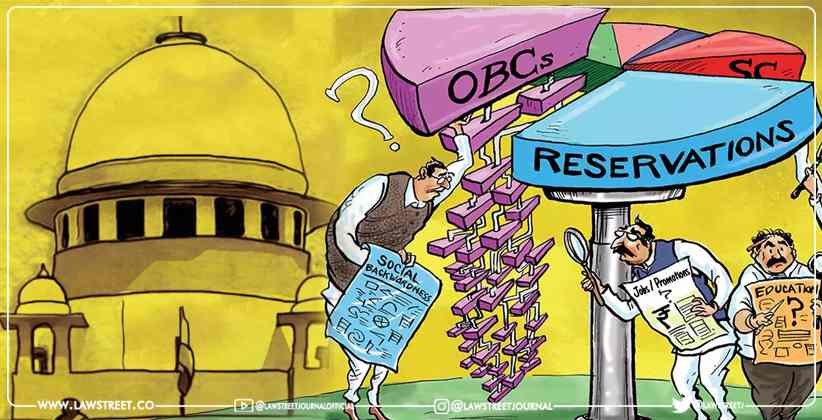The data must correspond to the period after the Supreme Court's 2006 verdict in M Nagaraj, by which certain conditions were laid down for the government before implementing provisions for reservation in promotion, according to a bench of justices L Nageswara Rao and BR Gavai.
On February 24 , 2022 , the Supreme Court ordered the Union government to produce "current data" to demonstrate their application of mind in providing for reservation in promotion for people from Scheduled Castes (SCs) and Scheduled Tribes (STs). The data must correspond to the period after the Supreme Court's 2006 verdict in M Nagaraj [1], by which certain conditions were laid down for the government before implementing provisions for reservation in promotion, according to a bench of justices L Nageswara Rao and BR Gavai.
Senior Advocate, Dr. Rajeev Dhavan pointed out the significance of contemporaneous data in the view of mandate in M.Nagraj by stating "The Union of India is asked to produce an affidavit giving particulars of the contemporaneous data, as well as the application of mind in providing reservation in promotion," the court said, giving the Centre two weeks to present the data.
In the M Nagaraj case, a constitution bench judgement in 2006 mandated that the state collect quantifiable evidence demonstrating the inadequacy of representation of a sector of the population in public employment while still maintaining overall administrative efficiency.
Another Constitutional bench affirmed the concept of measurable data in its 2018 judgement in the Jarnail Singh case, which also demanded the elimination of the "creamy layer" before allowing reservations in promotions.
In January, the Supreme Court rejected the Union government's request to weaken the necessity that the Centre and states collect quantifiable data to determine the representation of SCs and STs while imposing reservation in promotion.
The Supreme Court established the legal stance while reviewing a slew of petitions stemming from 11 distinct high courts' verdicts on various relevant reservation regulations during the last decade. These decisions were taken in Maharashtra, Bihar, Delhi, Uttar Pradesh, Tripura, Madhya Pradesh, and Punjab, among other states..
On Thursday, the court heard individual cases from various high courts in order to chart a course forward. However, the Centre's assistant solicitor general, Balbir Singh, said that the Union government has been evaluating data on an annual basis. "An officer has been assigned to investigate the data. "We have adequate provisions for data collection and analysis," the law officer continued. The attorneys on the opposing side disputed the ASG's statement about the existence of data, prompting the bench to order the Centre to put the data on record.
Tell us about data...the contemporaneous data and not the old one. You show us what you have done. We will start with cases from Delhi (high court), Punjab and Haryana (high court) and Railways. You submit your data to show how you gave reservation in promotion, the bench told Singh.
"That issue must be resolved as soon as possible," it continued. There are several promotions that have become stuck. There have already been three rulings. There should not be a fourth. You also point us in the right direction because we've become stuck in the last 15 years. You've also been whining about administrative challenges as a result of your inability to grant promotion."
Singh stated that the government would provide the data requested by the court within two weeks, allowing the next hearing in April to proceed.
A three-judge bench led by Justice Rao ruled in January 2022 that the data collected should be reviewed on a regular basis to determine inadequacy of representation for the purpose of providing reservation in promotions, leaving it up to the Centre and states to determine what constitutes a "reasonable" time gap for such an exercise.
The court overturned a 2019 decision by a two-judge bench that affirmed the constitutionality of a reservation statute in Karnataka and the approach of using a sample or the full service as the unit to evaluate the adequacy of representation for SCs/STs.
The court also turned down the Centre's request to establish judicial standards for determining inadequate representation of SCs and STs, stating that such a determination should be left to the state's discretion because it is based on a variety of variables that a court cannot anticipate.
In January, another argument on behalf of the Union government by attorney general KK Venugopal seeking proportionate representation as a measure of adequacy failed to gain traction with the court. "The learned Attorney General's attempt to persuade this court that the proportion of SCs/STs in India's population should be used as a criterion for establishing whether they are appropriately represented in promotional posts failed to yield results," the bench said in a prior ruling.
CASE TITLE: JARNAIL SINGH AND ORS. V. LACHHMI NARAIN GUPTA AND ORS. [2]
[1] M. Nagaraj And Ors. v. Union of India And Ors. (2006) 8 SCC 212
[2] C.A. No. 629 of 2022








